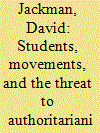|
|
|
Sort Order |
|
|
|
Items / Page
|
|
|
|
|
|
|
| Srl | Item |
| 1 |
ID:
181127


|
|
|
|
|
| Summary/Abstract |
The authority of political leaders in Bangladesh rests on diverse qualities, not least of which are the muscle and finance they can mobilize, and the relationships they can craft with senior party members. These are utilized to confront rivals both within and outside their own party. In some instances, the intensity of intra-party competition can be so severe that a further quality emerges: the capacity to find allies among enemies. Building local inter-party alliances can bolster the authority of politicians, yet be to the detriment of party coherence. This argument is developed through an analysis of mayoral and parliamentary elections held in the past decade in a small Bangladeshi city, where a ruling party member of parliament (MP) and opposition mayor appear to have developed such a relationship. This has thwarted the electoral ambitions of their fellow party members and has posed a serious challenge to party discipline. While political competition is often seen as being either inter- or intra-party, here it is focused around inter-party alliances. This portrayal suggests we need to give greater emphasis to the decentralized and local character that political authority can take in Bangladesh.
|
|
|
|
|
|
|
|
|
|
|
|
|
|
|
|
| 2 |
ID:
193135


|
|
|
|
|
| Summary/Abstract |
Bangladesh’s ruling Awami League Party has now won three consecutive general elections, an unprecedented achievement in the country’s political history. The 2014 and 2018 elections were, however, mired in controversy. Current analyses of the most recent of these center on the institutional and coercive tactics used by the Awami League to limit the political opposition. International media outlets have focused on allegations of vote rigging and intimidation. This article develops a deeper analysis of the Awami League victory, focusing on two city constituencies, both of which are traditional strongholds of the opposition Bangladesh Nationalist Party. Based on research before and after the 2018 election, it shows that managing party discipline enabled a coherence in the election not achievable by the opposition. The Awami League has, furthermore, successfully built a narrative around development achievements in the country and its vision for the future, both of which have had genuine traction with the public. The 2018 election revealed three pillars of the Awami League’s success: discipline, development, and duress.
|
|
|
|
|
|
|
|
|
|
|
|
|
|
|
|
| 3 |
ID:
180267


|
|
|
|
|
| Summary/Abstract |
Decades of violent yet competitive party politics in Bangladesh have been usurped by authoritarian consolidation under the ruling Awami League. Both mainstream ‘civil society’ and political opposition have been largely suppressed, left unable to wage the protests typical of the county’s politics. It is then striking that recent years have nonetheless seen significant urban unrest in the form of student led movements, coalescing around issues of injustice. Such social movements are neglected in the study of authoritarian durability, yet appear in practice to pose a serious threat to the ruling party. To understand this threat, this article examines two cases from 2018: the movements for reform to civil service quotas, and improved road safety. It argues such movements must be read in light of Bangladesh’s history, where students have played a major role in confronting authoritarian rule. In particular, they pose two threats: first, they have the potential to undermine the ruling party’s legitimacy and create a moment of crisis on which the opposition could capitalise; second, they can exacerbate tensions between interest groups on whom the ruling party rely to maintain power. Responding to such threats is thus crucial for the ruling party to maintain their grip on power.
|
|
|
|
|
|
|
|
|
|
|
|
|
|
|
|
|
|
|
|
|